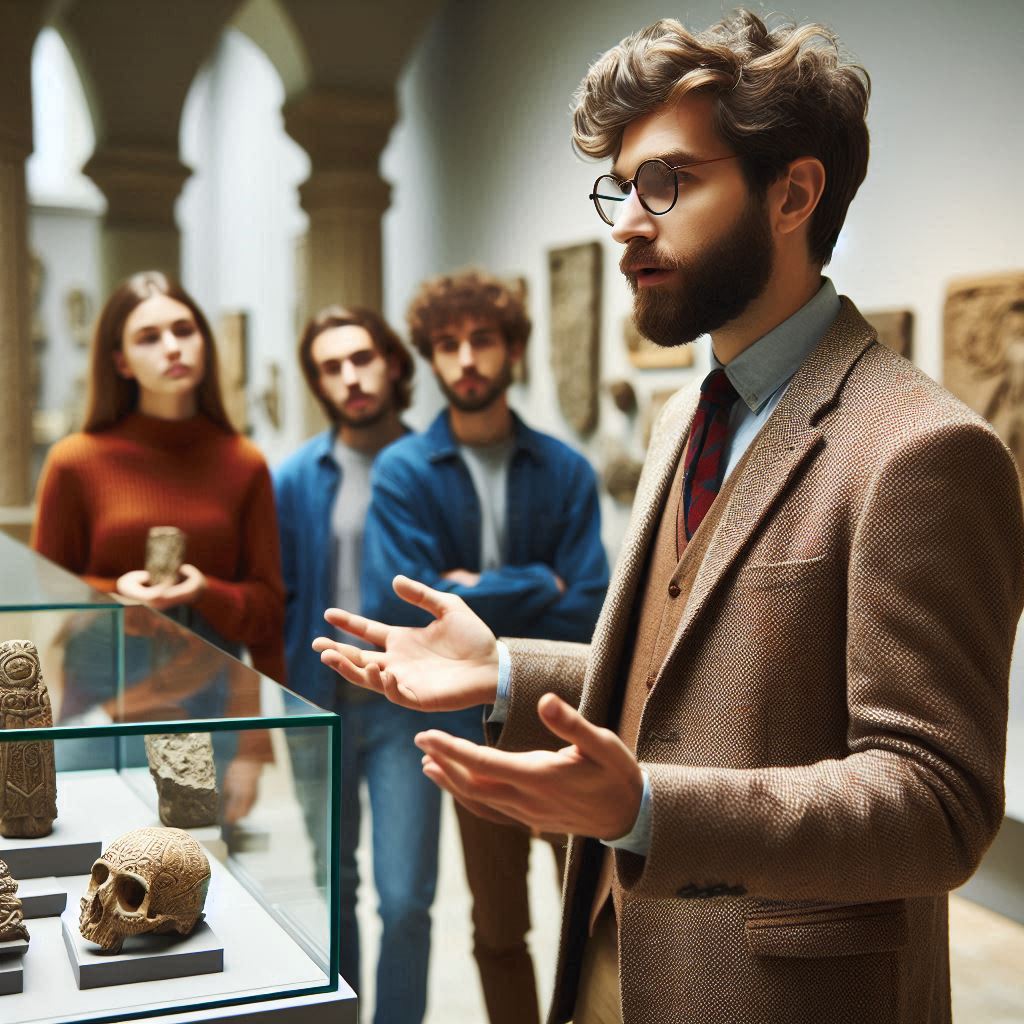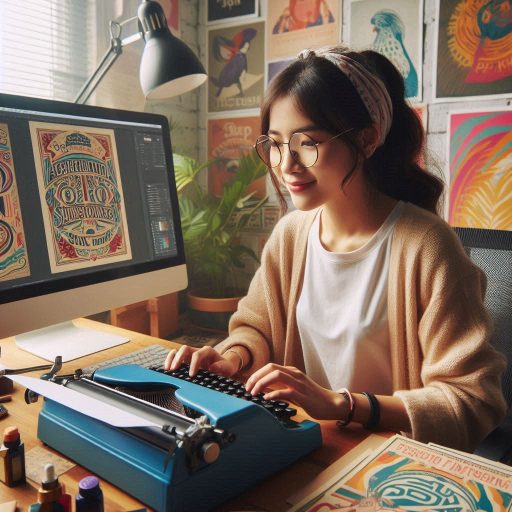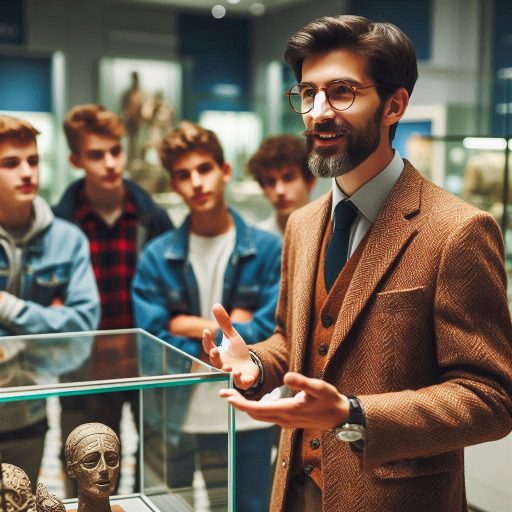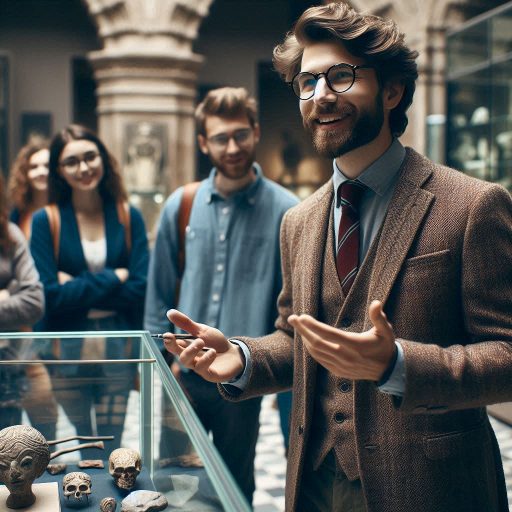Introduction
A museum curator plays a vital role in managing, preserving, and interpreting collections within museums and cultural institutions.
They are responsible for selecting and acquiring objects, organizing exhibitions, and ensuring that items are stored and cared for according to conservation standards.
Curators research the historical and cultural significance of artifacts, collaborate with other professionals to create engaging exhibits, and sometimes contribute to educational programs that help the public better understand the collections.
Their work directly impacts how audiences engage with history, art, and culture, making them key figures in shaping public appreciation of heritage.
Education and skills are critical in becoming a museum curator.
A strong educational background, often starting with a bachelor’s degree in art history, archaeology, anthropology, or museum studies, is the foundation of curatorial expertise.
Many curators pursue advanced degrees (master’s or Ph.D.) to deepen their understanding of specific areas, such as fine arts or ancient civilizations.
These degrees equip curators with the knowledge to analyze artifacts, contextualize exhibits, and make informed acquisitions.
Equally important are practical skills like research, project management, and public engagement.
Curators must possess excellent communication abilities to explain complex concepts to diverse audiences and work collaboratively with other museum staff.
Education Requirements
Education is a key component in becoming a successful museum curator.
Many employers require candidates to have at least a bachelor’s degree in art history, museum studies, anthropology, or a related field.
These degrees provide a strong foundation in the history and theory of art, as well as an understanding of the inner workings of museums.
Bachelor’s Degree
A bachelor’s degree in art history is a common path for aspiring museum curators.
This degree provides a comprehensive overview of art movements, styles, and artists throughout history.
It also emphasizes critical thinking and research skills, which are essential for curatorial work.
Alternatively, a degree in museum studies is another excellent choice for those interested in curatorial work.
This program focuses specifically on the management and curation of museum collections, exhibitions, and educational programs.
Students learn about museum ethics, conservation practices, and audience engagement techniques.
Anthropology is another relevant field of study for museum curators, especially those interested in cultural heritage and indigenous art.
Anthropology programs explore diverse cultures, societies, and artifacts, preparing students to work with ethnographic collections in museums.
Master’s Degree
While a bachelor’s degree is often sufficient for entry-level positions, advanced roles in museum curation typically require a master’s degree.
A Master of Arts in museum studies or a related discipline provides specialized training in curatorial practices, exhibition design, collection management, and museum administration.
Graduate programs in museum studies offer in-depth coursework and hands-on experience working in museums.
Students gain practical skills in cataloging, object conservation, public programming, and grant writing.
They also have the opportunity to network with museum professionals and secure internships at prestigious institutions.
Completing a master’s degree demonstrates a commitment to the field and a deep understanding of museum best practices.
It equips aspiring curators with the knowledge and skills necessary to curate exhibitions, conduct research, engage with diverse audiences, and contribute to the preservation of cultural heritage.
Internships and Work Experience
In addition to formal education, gaining practical experience through internships or work opportunities in museums is highly recommended for aspiring curators.
Internships provide hands-on training in various aspects of museum operations, from collections management to education outreach.
Interns have the chance to work closely with museum staff, curators, and educators, gaining valuable insights into the daily responsibilities of a curator.
They may assist with exhibition installations, research projects, public programs, and special events.
This hands-on experience enhances their resume and demonstrates their dedication to the field.
Employers value candidates with a combination of academic knowledge and practical skills acquired through internships or work experience.
By actively engaging in museum settings, aspiring curators develop a strong foundation for their future careers and increase their chances of securing desirable positions in the field.
Basically, a solid education in art history, museum studies, anthropology, or a related field, coupled with advanced degrees and practical experience through internships, prepares individuals to become successful museum curators.
By acquiring the necessary skills and qualifications, aspiring curators can pursue their passion for art, culture, and history while making a meaningful impact on museum collections and exhibitions.
Read: Freelance Character Design: How to Get Started
Specialized knowledge
Having specialized knowledge is essential for a museum curator to effectively manage and care for the collections under their stewardship.
Here are some key areas where specialized knowledge plays a crucial role
Understanding of art history, conservation techniques, and museum practices
A museum curator must have a thorough understanding of art history to contextualize and interpret the objects in their collection.
Knowing the historical significance and artistic context of each artifact enables curators to create engaging exhibitions and educational programs for visitors.
Additionally, knowledge of conservation techniques is vital to preserve and protect the artworks from damage or deterioration.
Curators need to collaborate with conservation specialists to ensure proper care and maintenance of the objects in their collection.
Furthermore, familiarity with museum practices, such as exhibition design, collection management, and public programming, is crucial for curators to fulfill their role effectively.
By staying current on best practices in the field, curators can enhance the visitor experience and promote the museum’s mission.
Familiarity with different types of collections and artifacts
Museum curators work with a wide range of collections, including art, historical artifacts, natural history specimens, and more.
Having knowledge about various types of collections enables curators to make informed decisions regarding acquisitions, displays, and conservation efforts.
Curators need to understand the unique characteristics and care requirements of each type of artifact in order to preserve them for future generations.
By being familiar with different collections, curators can curate exhibitions that showcase the diversity and richness of the museum’s holdings.
Knowledge of museum ethics and legal issues
Ethical considerations and legal issues are paramount in the museum field, as curators are responsible for upholding professional standards and stewarding cultural heritage ethically.
Curators must adhere to established codes of ethics and guidelines when acquiring, managing, and interpreting collections.
Transform Your Career Today
Unlock a personalized career strategy that drives real results. Get tailored advice and a roadmap designed just for you.
Start NowUnderstanding legal issues related to provenance, copyright, restitution, and cultural property is crucial for museum curators to avoid potential controversies or legal challenges.
By staying abreast of ethical and legal frameworks, curators can mitigate risks and safeguard the museum’s reputation and credibility.
Therefore, specialized knowledge in art history, conservation techniques, museum practices, different types of collections, and museum ethics and legal issues is fundamental for aspiring museum curators to excel in their profession.
By developing expertise in these areas, curators can contribute meaningfully to the preservation, interpretation, and promotion of cultural heritage within their institutions.
Read: Career Paths: Becoming a Professional Character Designer
Skills needed
Strong Research and Organizational Skills
A successful museum curator must possess strong research and organizational skills.
Curators are responsible for conducting in-depth research on artifacts, artworks, or historical items in their museum’s collection.
They gather information on the origin, significance, and historical context of each piece.
This research ensures that exhibits are accurate, informative, and engaging for the public.
Curators must also manage large amounts of data related to the museum’s collection.
This requires exceptional organizational skills to catalog and track items, ensuring they are properly documented and stored.
A curator’s research and organizational abilities are essential for maintaining the integrity of the museum’s collection and for planning future exhibits.
Attention to Detail and Ability to Work with Delicate Objects
Curators handle delicate and priceless objects that require meticulous care and handling.
They must demonstrate exceptional attention to detail when managing these items.
Whether it’s preparing a fragile painting for display or handling ancient artifacts, curators must take precise precautions to ensure the preservation of the items.
They are often responsible for overseeing the conservation of pieces in the collection, which requires a deep understanding of proper preservation techniques.
Curators work closely with conservation experts to ensure that objects are protected from damage, deterioration, or environmental factors like humidity and light exposure.
Their careful handling of these delicate objects is crucial in maintaining the museum’s collection for future generations.
Excellent Communication and Interpersonal Skills
Museum curators must possess excellent communication and interpersonal skills to succeed in their roles.
They are often responsible for sharing complex information with a broad audience, ranging from casual visitors to academic researchers.
Clear communication is essential when writing exhibit descriptions, educational materials, or conducting tours.
Curators also frequently give public presentations, lectures, or media interviews, making their ability to convey information effectively vital to their success.
Interpersonal skills are equally important, as curators often work with diverse groups, including donors, volunteers, and the museum’s staff.
A curator’s ability to build relationships and communicate clearly ensures that the museum remains a collaborative and welcoming environment.
Ability to Collaborate with Other Museum Staff and Researchers
Collaboration is at the heart of a museum curator’s role.
Curators often work with other museum staff, including archivists, educators, and conservators, to plan and execute exhibits.
Successful collaboration ensures that all aspects of an exhibit, from the research phase to the final display, are completed effectively.
In addition to working with internal staff, curators also collaborate with researchers and historians to expand the museum’s understanding of its collection.
These partnerships often lead to new discoveries or fresh insights that can enhance an exhibit.
A curator’s ability to work closely with others ensures that museum projects run smoothly and deliver meaningful experiences to the public.
Becoming a museum curator requires a combination of strong research, organizational skills, attention to detail, communication, and collaboration.
These skills are essential for curators to maintain the museum’s collection, engage the public, and foster partnerships within and outside the institution.
A curator’s ability to master these skills contributes to the success and growth of any museum.
Read: Best Tools and Software for Character Designers

Experience in the field
Volunteer or Part-Time Work in Museums
Gaining practical experience through volunteer or part-time work in museums is essential for aspiring museum curators.
These roles provide firsthand exposure to museum operations and a deeper understanding of curatorial tasks.
Many museums offer opportunities to work in various departments, from collections management to public programming.
These experiences not only build relevant skills but also demonstrate your dedication to the museum field.
By volunteering, you can learn how exhibits are developed, artifacts are preserved, and educational programs are executed.
Volunteering also offers the chance to interact with seasoned professionals who can offer guidance.
Whether you’re organizing archival materials or assisting with exhibit setups, each task helps you become familiar with curatorial processes.
Part-time roles also allow you to develop your communication, organizational, and research skills, which are crucial for a museum curator.
Starting with volunteer work provides valuable insight into the museum’s day-to-day operations.
This hands-on experience helps clarify if a career in museum curation aligns with your interests.
Internship Opportunities to Gain Practical Experience
Internships are another critical step for aspiring museum curators.
These opportunities allow you to gain practical experience while working alongside experienced professionals.
Many museums offer internships designed to provide in-depth knowledge of specific curatorial responsibilities.
Interns may assist in artifact preservation, exhibit design, research, or educational outreach.
During an internship, you can take on more specialized tasks that mirror the responsibilities of a curator.
Whether you’re researching collections, writing exhibit labels, or cataloging artifacts, internships provide meaningful contributions to museum projects.
Internships also allow you to explore different aspects of museum work, helping you determine where your strengths and passions lie.
Additionally, internships help build your resume, making you a more competitive candidate for future job opportunities.
Many full-time museum positions require applicants to have practical experience, and internships demonstrate your commitment to learning and contributing to the field.
Networking Within the Museum Community to Build Connections and Opportunities
Building a network within the museum community is essential for advancing your career as a curator.
Networking helps you stay informed about job openings, industry trends, and emerging opportunities.
Attending museum events, conferences, and workshops can connect you with professionals who can offer valuable advice or mentorship.
Joining professional organizations like the American Alliance of Museums (AAM) or International Council of Museums (ICOM) is another excellent way to network.
These organizations offer access to industry resources, networking events, and job listings that can be invaluable for curatorial career advancement.
By actively participating in these communities, you can build relationships with curators, museum directors, and other professionals who may recommend you for future roles.
Additionally, many jobs in the museum field are not publicly advertised, making personal connections essential.
By networking effectively, you increase your visibility within the museum world and create opportunities for future collaborations.
By combining volunteer work, internships, and networking, you can build the practical experience and professional connections needed to launch a successful museum curation career.
Continuing education
Stay current with trends in museum studies and technology
As a museum curator, it is essential to stay up-to-date with the latest trends in museum studies.
This includes understanding emerging technologies that can enhance the visitor experience and improve collections management.
One way to stay current is by regularly reading academic journals, attending webinars, and participating in online forums dedicated to museum professionals.
By actively engaging with the field, you can gain valuable insights into best practices and innovative approaches that can benefit your work as a curator.
Attend conferences, workshops, and training programs
Networking and professional development opportunities are crucial for museum curators looking to expand their knowledge and skills.
Conferences, workshops, and training programs offer a chance to learn from industry experts, exchange ideas with peers, and discover new resources and tools.
When choosing which events to attend, consider your specific areas of interest and professional goals.
Look for conferences that feature sessions on topics such as collection management, exhibition design, fundraising, and audience engagement.
Workshops and training programs can provide hands-on experience with new technologies and methodologies that can enhance your curatorial practice.
Pursue advanced degrees or certifications to enhance skills and knowledge
For museum curators seeking to advance their careers and expertise, pursuing advanced degrees or certifications can be a valuable investment.
Graduate programs in museum studies, art history, or related fields can provide a strong foundation in curatorial practices, research methods, and museum management.
Additionally, earning specialized certifications in areas such as collections care, exhibition development, or digital curation can demonstrate your commitment to professional excellence and enhance your credibility as a curator.
These credentials can also open up new opportunities for career advancement and leadership roles within the museum field.
Overall, continuing education is essential for museum curators to stay relevant, informed, and competitive in an ever-evolving industry.
By actively seeking out learning opportunities, staying connected to peers and mentors, and investing in advanced training.
Curators can enhance their skills and knowledge and make meaningful contributions to the cultural heritage sector.
Read: Ceramic Art: From Hobby to Professional Career
Building a Portfolio
Creating a comprehensive portfolio is essential for aspiring museum curators.
A well-documented portfolio can showcase your experience, expertise, and achievements in the field of museum practices.
Here are some key points to consider when building your portfolio
Documenting Projects, Exhibits, and Research Work
- Include detailed descriptions of projects you have worked on, exhibitions you have curated, and research work you have completed.
- Provide photographs, videos, or any other visual documentation to support your accomplishments.
- Showcase your ability to conceptualize, plan, and execute various types of museum-related projects.
Showcasing Experience and Expertise in Museum Practices
- Highlight your hands-on experience with artifact handling, conservation, exhibition design, and collection management.
- Demonstrate your knowledge of museum best practices, including ethical standards, legal requirements, and community engagement.
- Illustrate your skills in conducting research, writing interpretive texts, and developing educational programs for museum visitors.
Highlighting Areas of Specialization and Achievements in the Field
- Identify your areas of specialization within the museum field, such as art history, anthropology, natural history, or cultural heritage.
- Showcase any awards, grants, publications, or presentations that demonstrate your professional achievements and contributions to the field.
- Explain how your unique perspective, expertise, and accomplishments can contribute to the mission and goals of the museums you wish to work for.
Overall, your portfolio should serve as a comprehensive representation of your skills, knowledge, and passion for museum work.
Keep it updated, organized, and tailored to the specific requirements of the institutions you are applying to.
A strong portfolio can set you apart from other candidates and increase your chances of securing a position as a museum curator.
Professional development
Joining Professional Organizations Such as the American Alliance of Museums
Joining professional organizations is a strategic step for aspiring museum curators.
The American Alliance of Museums (AAM) provides valuable resources for professionals in the field.
Membership offers access to industry news, best practices, and professional development opportunities.
Curators can participate in workshops and conferences, enhancing their knowledge and skills.
Networking with other museum professionals fosters connections that can lead to job opportunities.
Additionally, AAM provides certifications that can boost a curator’s credentials.
By engaging with these organizations, curators stay current on trends and challenges facing the museum sector.
Participating in Mentorship Programs or Peer Networks
Participating in mentorship programs significantly benefits aspiring curators.
These programs connect emerging professionals with experienced curators who provide guidance and support.
Mentorship helps new curators navigate their careers, offering insights into various aspects of the profession.
A mentor can share valuable experiences, helping mentees develop essential skills and knowledge.
This relationship can also lead to job recommendations and networking opportunities.
Peer networks also play a crucial role in professional growth.
Engaging with colleagues allows for the exchange of ideas and resources.
Curators can collaborate on projects and share challenges, fostering a sense of community.
Seeking Out Leadership Opportunities Within the Museum Community
Seeking leadership opportunities is essential for professional development in the museum community.
Aspiring curators should look for chances to lead projects or initiatives within their organizations.
Taking on responsibilities such as coordinating exhibitions or educational programs builds essential skills.
These experiences demonstrate a curator’s capability to manage teams and resources effectively.
Additionally, volunteering for committees or boards within professional organizations provides further leadership experience.
Engaging in these roles showcases a commitment to the museum field.
Such involvement also expands one’s professional network, opening doors for future opportunities.
Curators should also consider pursuing roles that allow them to influence museum policies and practices.
This involvement can include serving on advisory boards or participating in strategic planning committees.
These experiences provide valuable insights into the inner workings of museums.
They also empower curators to advocate for positive changes in their institutions.
Conclusion
Becoming a museum curator is a rewarding career that blends passion for history, art, and culture with the ability to manage and preserve important collections.
Throughout this post, we discussed the essential steps to success in the field.
A key starting point is obtaining a relevant degree, such as in art history, archaeology, anthropology, or museum studies, which provides a strong educational foundation.
Equally important is gaining hands-on experience through internships or volunteering at museums, which allows you to apply your knowledge in real-world settings.
In addition to education, developing a range of skills is crucial.
Museum curators must be excellent researchers, communicators, and organizers, with the ability to curate exhibits that engage and educate the public.
Staying updated on the latest industry trends, attending workshops, and pursuing continuing education are also valuable for career growth.
For aspiring museum curators, pursuing this path requires dedication, persistence, and a deep love for culture and preservation.
With the right combination of education, skills, and experience, success is within reach.
Pursue your passion with confidence, knowing that your dedication to preserving history and culture will create a lasting impact.




